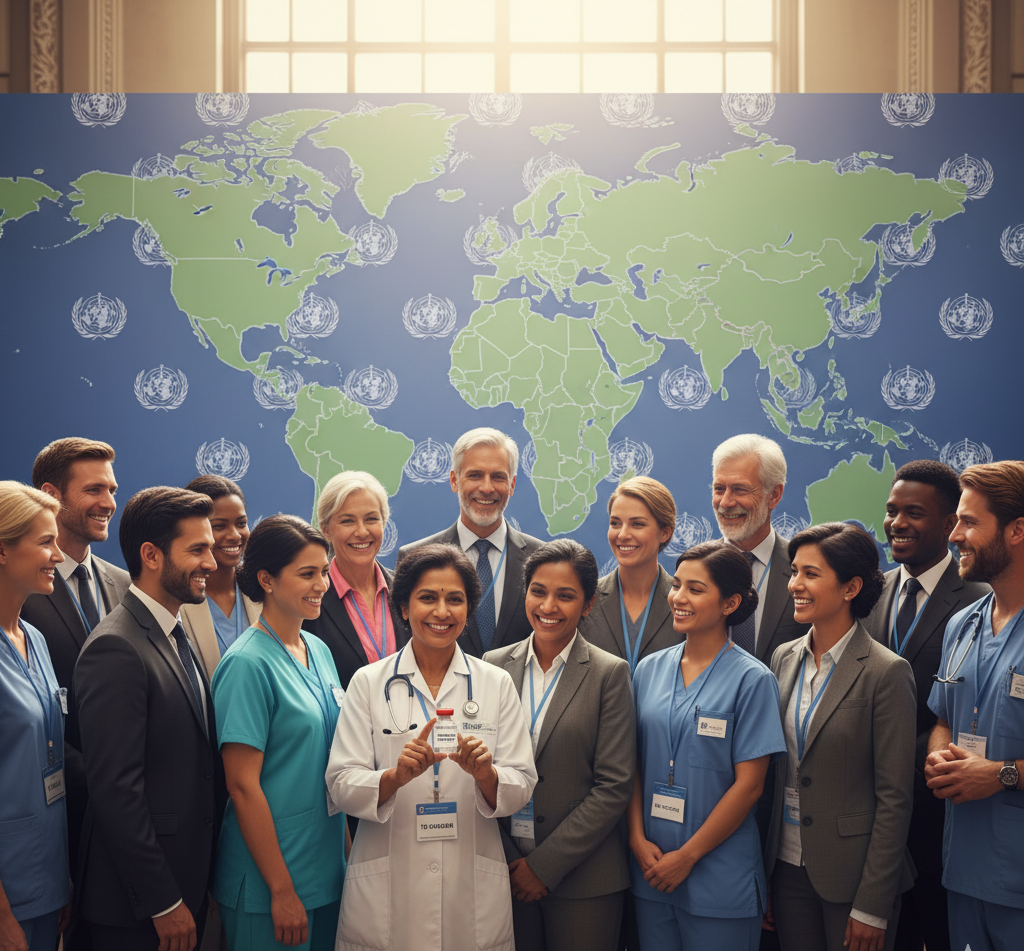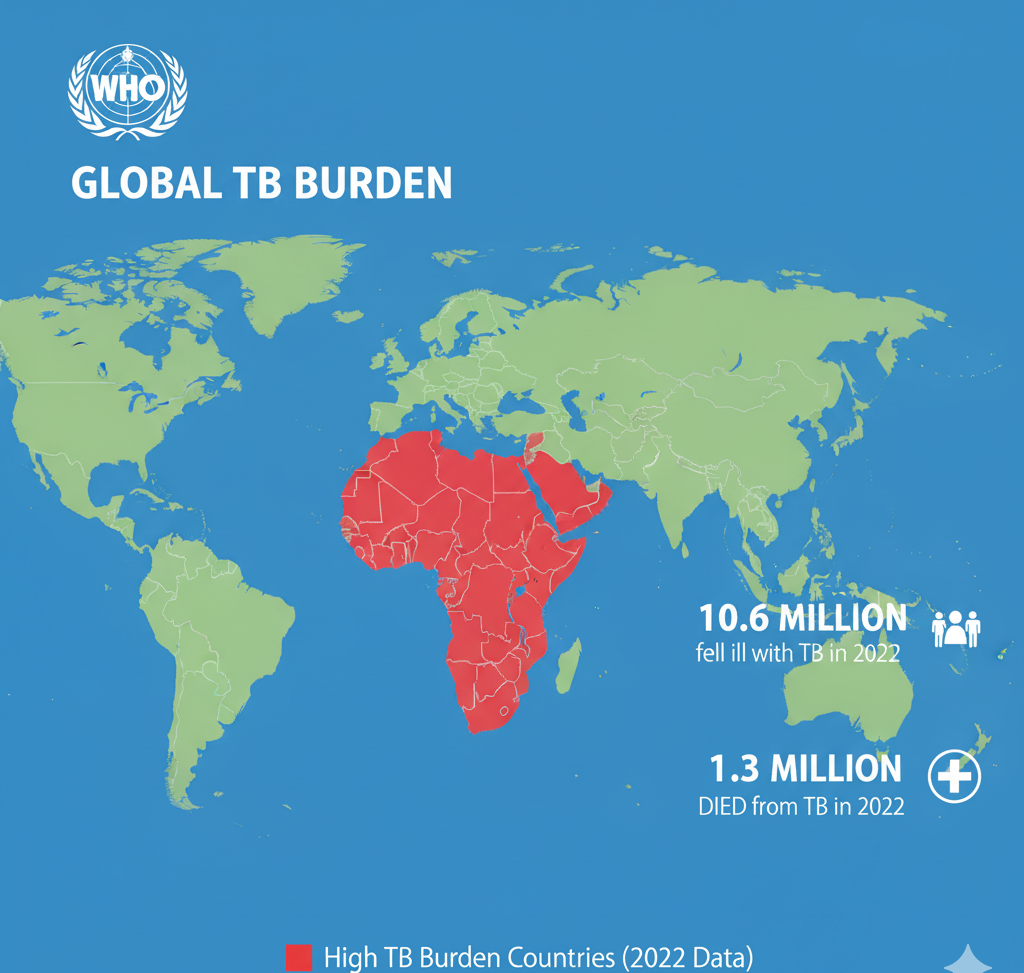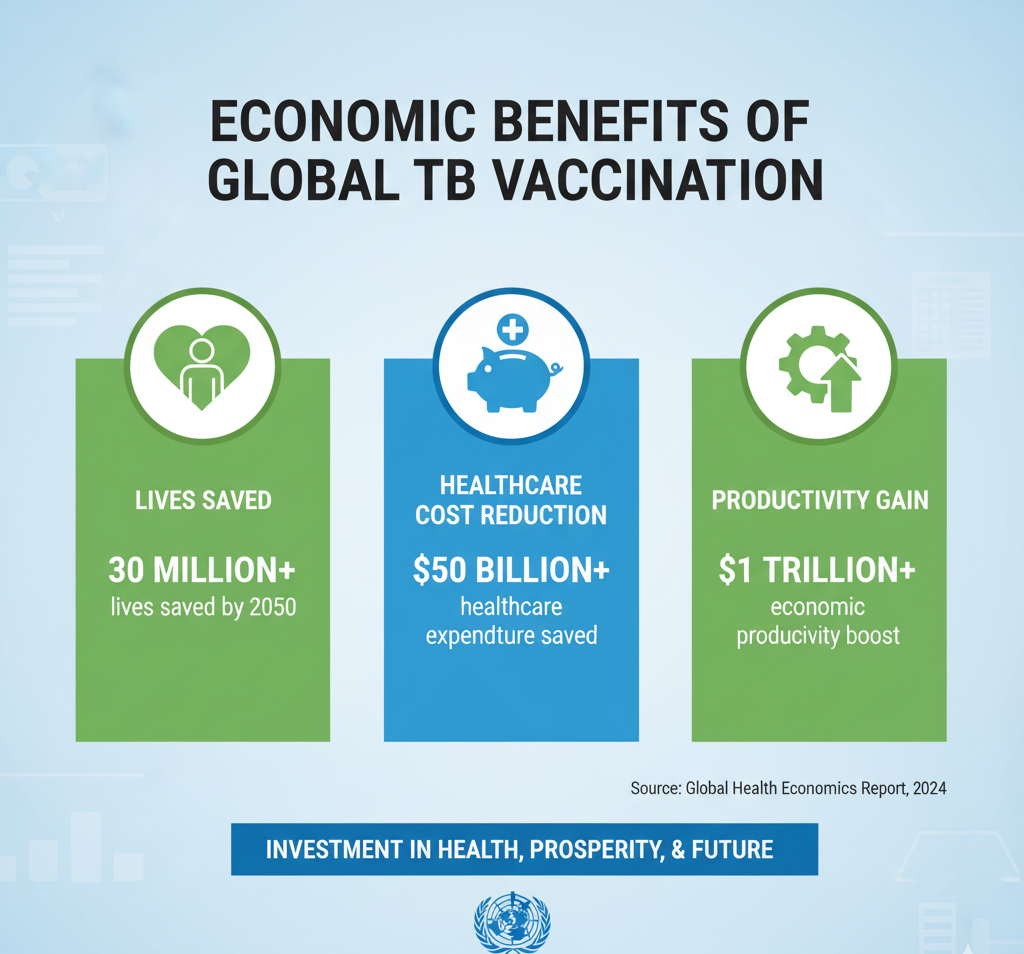Introduction
Tuberculosis (TB) remains one of the deadliest infectious diseases in the world, killing over 1.3 million people annually, according to the latest World Health Organization (WHO) report. Despite being preventable and curable, TB continues to affect millions—especially in low- and middle-income countries like India, where the disease burden remains alarmingly high.
The WHO’s new report, “Expanding Access to Novel TB Vaccines,” calls on governments, research institutions, and global health agencies to invest in equitable vaccine development and delivery. The report emphasises that equitable access to new TB vaccines could save millions of lives, reduce health inequalities, and bring the world closer to the 2030 End TB Goal.
Overview: Why TB Still Matters in 2025
While global attention often shifts to emerging diseases, TB has never truly disappeared. It continues to infect 10 million people each year, with India, Indonesia, China, and the Philippines accounting for nearly half of global cases.
In India alone, the National Tuberculosis Elimination Programme (NTEP) reports over 2.4 million new cases annually, making it a major public health challenge.
The WHO’s new report highlights that while the world successfully developed COVID-19 vaccines in record time, TB vaccine research has remained stagnant—the only widely used TB vaccine, BCG, was developed over a century ago.
Current TB Vaccines and Their Limitations
The Bacille Calmette–Guérin (BCG) vaccine, developed in 1921, remains the only licensed TB vaccine. While it offers protection against severe TB in infants and young children, it provides limited and inconsistent protection against pulmonary TB—the most contagious form of the disease in adults.
Limitations of the BCG Vaccine:
-
Provides incomplete protection for adolescents and adults
-
Does not prevent latent TB infection from becoming active disease
-
Efficacy varies across populations due to genetic and environmental factors
-
Immunity wanes over time, often requiring booster strategies
This gap in vaccine effectiveness is what prompted the WHO and partners like Gavi, the Vaccine Alliance, and the Bill & Melinda Gates Foundation to call for urgent action to accelerate novel TB vaccine research and equitable access mechanisms.
The Promise of Novel TB Vaccines
Over the past decade, global researchers have been developing more than 15 TB vaccine candidates, including M72/AS01E, VPM1002, and MTBVAC. Several of these have shown encouraging results in Phase 2 and 3 trials.
Key Vaccine Candidates:
-
M72/AS01E (GSK + Gates Foundation):
Demonstrated nearly 50% efficacy in preventing active TB among adults with latent infection. -
VPM1002 (Serum Institute of India):
A modified BCG vaccine showing promise for both infants and adults with improved safety and immune response. -
MTBVAC (Biofabri, Spain):
The first live-attenuated TB vaccine derived from Mycobacterium tuberculosis itself, potentially providing broader immunity.
The WHO has recognised these candidates as breakthroughs in TB vaccine innovation and urges governments to invest in large-scale production, regulatory approval, and equitable distribution.
WHO’s Call for Equitable Access
The WHO’s 2025 report stresses that new vaccines must not repeat the access inequities seen during the COVID-19 pandemic. Developing countries, which bear 95% of TB cases, should not be last in line for vaccine delivery.
Key Recommendations from the WHO Report:
-
Establish a Global TB Vaccine Access Framework
-
Secure funding commitments from G20 and BRICS nations, including India
-
Support technology transfer to regional vaccine manufacturers
-
Integrate TB vaccination into universal immunisation programmes
-
Ensure gender and poverty-sensitive delivery strategies
Dr. Tedros Adhanom Ghebreyesus, WHO Director-General, said:
“We need the same urgency, innovation, and political commitment for TB that we saw during COVID-19. No child, no adult should die from a disease we can prevent.”
India’s Role and Responsibility
India carries the highest TB burden globally, accounting for nearly 27% of all cases. The government’s Pradhan Mantri TB Mukt Bharat Abhiyaan aims to eliminate TB by 2025—five years before the global target. However, experts say that without a new generation of TB vaccines, this goal may remain out of reach.
The Serum Institute of India and Bharat Biotech are actively involved in developing novel TB vaccines. If approved, these could be integrated into India’s Universal Immunisation Programme (UIP)—ensuring free and equitable access for all.
The WHO has praised India’s leadership in vaccine production and called for expanded clinical trials and public-private partnerships to fast-track TB vaccine rollouts.
TB Burden and Impact in India
According to India’s 2024 TB Report:
-
2.4 million people were diagnosed with TB last year
-
Over 70,000 multidrug-resistant (MDR-TB) cases were reported
-
56,000 deaths were attributed to TB complications
The disease disproportionately affects low-income families, urban slums, and undernourished populations, making equitable vaccine access not just a medical issue—but a social justice imperative.
How Universal Immunisation Can Help
Integrating TB vaccines into the Universal Immunisation Programme ensures systematic coverage across states and socioeconomic groups. With India’s existing digital infrastructure—like Co-WIN and Quickobook’s health record linkage—tracking vaccine doses and monitoring adverse effects becomes easier and transparent.
Benefits of Integration:
-
Efficient nationwide rollout through existing immunisation centres
-
Improved surveillance and reporting
-
Reduced stigma around TB
-
Cost-effective implementation
Universal immunisation is not just about vaccines—it’s about equal opportunity for health and protection.
ALSO READ: Doctors Urge Parents To Prioritise Vaccination As Pneumonia Cases Surge Among Children In Bengaluru
Challenges Ahead
Despite optimism, several hurdles remain:
-
Limited funding for large-scale vaccine trials
-
Regulatory barriers in multi-country testing
-
Public mistrust and TB stigma
-
Inadequate awareness in rural areas
-
Need for trained healthcare professionals
The WHO calls for collaboration across governments, academia, and private manufacturers to overcome these challenges.
The Economic and Social Case for TB Vaccination
Investing in TB vaccines is not only lifesaving—it’s economically sound. According to the WHO’s analysis:
-
Every ₹1 invested in TB vaccination yields a ₹10 return through reduced treatment costs and productivity losses.
-
New vaccines could prevent 8.5 million deaths between 2025–2050.
-
Preventing TB saves healthcare systems billions in antibiotic and hospital costs.
For countries like India, early investment in TB vaccination equals better health outcomes, fewer deaths, and stronger economies.
Global Collaboration and Future Outlook
The WHO urges countries, donors, and private manufacturers to sign a Global TB Vaccine Accord to share research, intellectual property, and manufacturing capacity.
Future Goals (2030 and Beyond):
-
At least two new TB vaccines approved by 2030
-
50% reduction in TB incidence worldwide
-
Zero catastrophic costs for TB-affected families
-
Inclusion of TB vaccines in routine immunisation schedules globally
WHO hopes that with sustained funding and global solidarity, a TB-free world could become a reality within our lifetime.
Conclusion
The new WHO report is not just a policy document—it’s a wake-up call. The world must treat TB with the same urgency and innovation shown during COVID-19. For India, this means supporting vaccine research, accelerating trials, and ensuring equitable access through universal immunisation.
With timely action, collaboration, and awareness, we can transform the TB vaccine dream into a reality—protecting millions and paving the path to a TB-free future.
Quickobook Call to Action
Concerned about TB prevention or vaccination?
Book a pulmonologist or infectious disease specialist near you instantly on Quickobook.com.
Stay updated on vaccine trials, health alerts, and immunisation schedules—all in one trusted healthcare platform.
Disclaimer
This article is for informational purposes only. It does not replace medical consultation. Always discuss vaccination, screening, or TB treatment options with a qualified healthcare provider.
50 FAQs About TB Vaccine and Universal Immunisation
Q1. What is the TB vaccine?
The TB vaccine, known as BCG, helps protect against severe forms of tuberculosis in children.
Q2. Why is a new TB vaccine needed?
Because the existing BCG vaccine offers limited protection for adults and does not prevent pulmonary TB effectively.
Q3. How does tuberculosis spread?
Through the air when a person with active TB coughs, sneezes, or talks.
Q4. Who is most at risk of TB?
People with weak immunity, malnutrition, or living in crowded conditions.
Q5. What is the global TB burden?
About 10 million new cases and 1.3 million deaths annually.
Q6. How effective is the BCG vaccine?
It prevents severe childhood TB but only partially protects adults.
Q7. Are new TB vaccines being developed?
Yes, several candidates like M72/AS01E and VPM1002 are in advanced stages.
Q8. What is the role of the WHO in TB vaccination?
WHO coordinates global research, funding, and equitable access frameworks.
Q9. What is equitable access?
Ensuring all populations, rich or poor, have fair access to life-saving vaccines.
Q10. How will the new TB vaccine differ from BCG?
It aims to protect adolescents and adults and prevent pulmonary TB.
Q11. What is latent TB?
When a person is infected but shows no symptoms; it can later become active.
Q12. Can TB be cured without vaccines?
Yes, with antibiotics, but prevention through vaccines is far better.
Q13. When will the new TB vaccine be available?
WHO expects at least one candidate by 2030.
Q14. How is India contributing to TB vaccine research?
Institutes like the Serum Institute of India are conducting major clinical trials.
Q15. What is MDR-TB?
Multidrug-resistant TB that doesn’t respond to standard antibiotics.
Q16. How many TB deaths occur in India annually?
Over 56,000 as of the 2024 report.
Q17. Can adults receive TB vaccines?
Current BCG isn’t routinely given to adults, but new vaccines are being tested for this group.
Q18. Are TB vaccines safe?
Yes, all licensed vaccines undergo rigorous safety testing.
Q19. Is TB vaccine part of India’s Universal Immunisation Programme?
Yes, BCG is part of the national immunisation schedule for newborns.
Q20. What is the cost of TB treatment in India?
Treatment is free under government TB programs.
Q21. What is the End TB Strategy?
A global WHO initiative to end TB by 2030.
Q22. Can TB vaccines prevent drug-resistant TB?
Potentially yes, by preventing infections before drug resistance develops.
Q23. How is TB diagnosed?
Through sputum tests, X-rays, and GeneXpert molecular testing.
Q24. What is M72/AS01E?
A new TB vaccine showing 50% efficacy in preventing active TB.
Q25. What is VPM1002?
An Indian-developed vaccine offering broader and safer protection.
Q26. Does TB affect only the lungs?
Mostly lungs, but it can also affect bones, brain, or kidneys.
Q27. Can TB spread through food or touch?
No, it spreads only through airborne droplets.
Q28. Is TB vaccination mandatory?
It’s recommended for all newborns in India.
Q29. Can TB reoccur after treatment?
Yes, especially if treatment wasn’t completed or immunity is low.
Q30. What is universal immunisation?
A public health program ensuring every child receives essential vaccines.
Q31. How can universal immunisation reduce TB deaths?
By ensuring high vaccine coverage across all communities.
Q32. What is the role of Quickobook in vaccination awareness?
Quickobook connects patients with verified doctors and vaccination services online.
Q33. Is there a TB vaccine for adults?
New vaccines under development aim to provide adult protection.
Q34. Can TB be prevented without vaccines?
Improving ventilation, nutrition, and infection control helps but doesn’t replace vaccination.
Q35. How can TB stigma affect vaccination uptake?
Stigma discourages people from seeking vaccination or testing.
Q36. What are TB symptoms?
Persistent cough, fever, weight loss, and night sweats.
Q37. Can pregnant women take TB vaccines?
BCG is usually given after birth; consult a doctor for special cases.
Q38. What is the TB vaccine schedule?
BCG is given at birth; new vaccines may have different schedules.
Q39. Can adults in India opt for new TB vaccines once available?
Yes, after government approval and rollout.
Q40. How does nutrition affect TB prevention?
Strong immunity reduces the risk of infection and complications.
Q41. What is the connection between TB and HIV?
People with HIV are more prone to TB infection.
Q42. How does WHO support TB elimination in India?
Through technical assistance, funding, and vaccine trial support.
Q43. Can TB vaccines be combined with other vaccines?
Clinical trials are exploring safe combinations.
Q44. Are TB vaccines stored like other vaccines?
Yes, under cold chain conditions between 2°C and 8°C.
Q45. How long does TB immunity last after vaccination?
BCG offers protection for 10–15 years; new vaccines aim for longer.
Q46. Can TB vaccines cause side effects?
Usually mild—redness or swelling at the injection site.
Q47. How does India monitor vaccine safety?
Through AEFI (Adverse Events Following Immunisation) surveillance systems.
Q48. How can the public support TB vaccination efforts?
By spreading awareness, completing vaccine schedules, and avoiding stigma.
Q49. What is the future of TB vaccines?
More effective, safer, and accessible vaccines for all age groups by 2030.
Q50. Where can I get TB vaccine updates and appointments?
Visit Quickobook.com for verified clinics and latest vaccine updates.












Comments (0)
No comments yet. Be the first to share your thoughts!
Leave a Comment